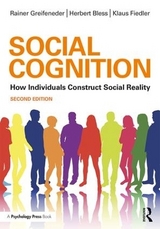
Social Cognition
Psychology Press Ltd (Verlag)
978-0-86377-829-2 (ISBN)
- Titel erscheint in neuer Auflage
- Artikel merken
How do people think about the world? How do individuals make sense of their complex social environment? What are the underlying mechanisms that determine our understanding of the social world?
Social cognition - the study of the specific cognitive processes that are involved when we think about the social world - attempts to answer these questions. Social cognition is an increasingly important and influential area of social psychology, impacting on areas such as attitude change and person perception. This introductory textbook provides the student with comprehensive coverage of the core topics in the field: how social information is encoded, stored and retrieved from memory; how social knowledge is structured and represented; and what processes are involved when individuals form judgements and make decisions.
The overall aim is to highlight the main concepts and how they interrelate, providing the student with an insight into the whole social cognition framework. With this in mind, the first two chapters provide an overview of the sequence of information processing and outline general principles. Subsequent chapters build on these foundations by providing more in-depth discussion of memory, judgemental heuristics, the use of information, hypothesis-testing in social interaction and the interplay of affect and cognition. Social Cognition will be essential reading for students and researchers in psychology, communication studies, and sociology.
Preface. Part 1. Introduction: What is Social Cognition? Making Sense: The Construction of Social Reality. Different Perspectives on the Social Thinker. The Cognitive Component of Social Cognition. What is Social about Social Cognition? Overview - The Structure of This Book. Chapter Summary. Discussion Questions. Part 2. A First Look at Social Cognition: General Framework and Basic Assumptions. Overview: Main Ingredients and Steps of Information Processing. General Themes Underlying the Construction of Social Reality. Theme 1: Top-down and Bottom-up Processing. Theme 2: The Limitation of Human Processing Capacity Requires Simplifications and Short-cuts. Theme 3: Amount of Processing: Processing Capacity and Processing Motivation. Theme 4: Automatic and Controlled Processes. The Sequence of Information Processing. Perception and Attention. What Attracts Individuals' Attention? What are the Consequences of Salience? Encoding and Interpretation. Storage and Retrieval. Further Processes, Inferences, Judgments and Decisions. Selecting, Weighing, and Integrating Information. Heuristics as Judgmental Short-Cuts. The Selection of a Behavioral Response. Chapter Summary. Discussion Questions. Part 3. Memory Organizing as a Key to Understanding Social Cognition. How is Information Organized in Memory? Types of Representation of Knowledge Structures. Cognitive Consistency. How is Information Retrieved? The Priming Paradigm as a Major Research Tool. Types of Priming. Linking Old to New Information. The Self as a Powerful Knowledge Structure. A Place for Inconsistent Information. Controlling the Consequences of Activated Information. Direct Correction. Recomputation. Differential Use of Activated Information. Automatic Control of Stereotyping. Using Implicit Social Cognition for Diagnostic Purposes. Chapter Summary. Discussion Questions. Part 4. Judgmental Heuristics in Social Cognition. Introduction. What are Judgmental Heuristics? Availability Heuristic. Ease of Retrieval as Basis of Judgment. Dissociation between Ease of Retrieval and Frequency. Perceived Ease of Retrieval. The Availability Heuristic in Social Judgments. Representativeness Heuristic. Representativeness as the Basis of Judgment. A Single Element as Representative of a Category: Ignoring Base Rates. A Conjunction is Representative of One Person: Disregarding the Principle of Extensionality. A Sample is Representative for the Whole: Misperception of Coincidence. Anchoring and Adjustment. What Causes the Anchoring Effect? The Selective Accessibility Model (SAM). Adjustment and Anchoring in the Formation of Social Judgments. Other Heuristics in the Judgmental Process. Feelings as the Basis for Heuristic Judgment Formation. Affective Feelings. Non-affective Feelings as the Basis of Judgment. Specific Stimuli Characteristics as the Basis for Heuristic Judgments. Alternative Explanations and Further Developments. Task Understanding. Other Cognitive Processes. Presentation Format. Concluding Remarks. Possibilities and Conditions of the Flexible Use of Judgmental Heuristics. Outlook. Chapter Summary. Discussion Questions. Part 5. The Use of Information in Judgments. Using What's on Your Mind! Cognitive Aspects of Information Use. Awareness of Being Influenced. Content or Experience? Typicality and Representativeness. Applicability. The Communication of Judgments. The Inclusion/exclusion Model. Motivational Aspects of Information Use. Content versus Experience - A Question of Processing Motivation. Accountability and Reasons. Individual's Motivation to Avoid the Impact of Stereotypes. Individuals' Need for Cognition. The Role of Knowledge. Chapter Summary. Discussion Questions. Part 6. Testing Hypothesis in Social Interaction: How Cognitive Processes are Constrained by Environmental Data. Social Hypothesis Testing: Updating Knowledge in the Light of Environmental Data. Self-selected Data: The Information Search Paradigm. Self-produced Data:
| Erscheint lt. Verlag | 18.11.2003 |
|---|---|
| Reihe/Serie | Social Psychology, A Modular Course |
| Verlagsort | Hove |
| Sprache | englisch |
| Maße | 172 x 216 mm |
| Gewicht | 431 g |
| Themenwelt | Geisteswissenschaften ► Psychologie ► Sozialpsychologie |
| Geisteswissenschaften ► Psychologie ► Verhaltenstherapie | |
| Schlagworte | Soziale Kognition |
| ISBN-10 | 0-86377-829-1 / 0863778291 |
| ISBN-13 | 978-0-86377-829-2 / 9780863778292 |
| Zustand | Neuware |
| Haben Sie eine Frage zum Produkt? |
aus dem Bereich



